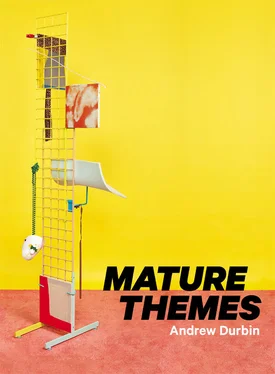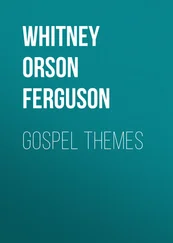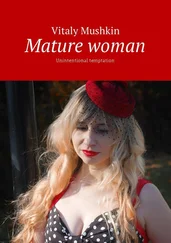Andrew Durbin - Mature Themes
Здесь есть возможность читать онлайн «Andrew Durbin - Mature Themes» весь текст электронной книги совершенно бесплатно (целиком полную версию без сокращений). В некоторых случаях можно слушать аудио, скачать через торрент в формате fb2 и присутствует краткое содержание. Год выпуска: 2014, Издательство: Nightboat Books, Жанр: Современная проза, на английском языке. Описание произведения, (предисловие) а так же отзывы посетителей доступны на портале библиотеки ЛибКат.
- Название:Mature Themes
- Автор:
- Издательство:Nightboat Books
- Жанр:
- Год:2014
- ISBN:нет данных
- Рейтинг книги:4 / 5. Голосов: 1
-
Избранное:Добавить в избранное
- Отзывы:
-
Ваша оценка:
- 80
- 1
- 2
- 3
- 4
- 5
Mature Themes: краткое содержание, описание и аннотация
Предлагаем к чтению аннотацию, описание, краткое содержание или предисловие (зависит от того, что написал сам автор книги «Mature Themes»). Если вы не нашли необходимую информацию о книге — напишите в комментариях, мы постараемся отыскать её.
is a hybrid text of poetry, art criticism, and memoir focused on the subject of disingenuity — and what constitutes "personal experience" both online and IRL when to "go deep" in a culture of so many unreliable communication technologies is to resend a text at 3 AM.
Throughout the book, Durbin’s voice mutates into others in order to uncover the fading specters of meaning buried under the pristine surfaces of art and Hollywood, locating below them the other realities that structure our experience of both.
Mature Themes — читать онлайн бесплатно полную книгу (весь текст) целиком
Ниже представлен текст книги, разбитый по страницам. Система сохранения места последней прочитанной страницы, позволяет с удобством читать онлайн бесплатно книгу «Mature Themes», без необходимости каждый раз заново искать на чём Вы остановились. Поставьте закладку, и сможете в любой момент перейти на страницу, на которой закончили чтение.
Интервал:
Закладка:
SIR DRONE
Raymond Pettibon writes on Twitter: “Art will recover from its low self-esteem vis-à-vis other ‘disciplines’ when artists are recruited by the CIA — as they were in the 50’s(smile).” For a second I wonder if the parenthetical smile suggests Pettibon has secret information about artist spies or if he himself was an artist spy in the 1950s, but since he was born in 1957, I credit the tweet to the usual spooky disposition of his Twitter, where he often writes conspiratorially about GG Allin, sports, punk rock, art, violence, and politics, using a prose style notable for its confusing grammar, atypical punctuation, and eccentric choices in spelling— especially in his use of the letter Y, which manifests virally where it never belongs, populating words with an extra vowel/consonant that often confuses their sense-meaning. His father wrote spy novels and writing — a fundamental component to his work—“came natural” to him, as the Los Angeles Times wrote about the 33 year-old Pettibon in 1991. They described him as having a boxer’s nose, and if I were to describe him now I’d say the same thing. We both live in New York and sometimes I think I might run into him. I went to his 2013 show at David Zwirner in Chelsea with my friend Ed several weeks after it opened and impossibly expected him to be there, but of course there was no way he’d be at the gallery on that day — or on any day, for that matter. I can’t really place why seeing his work imposes his presence or the possibility of his presence on me. I suppose it’s the largeness of his personality, in his art and on Twitter, that makes me think he lives in every space where you find him, Y-like — edged with the sense that he could be there just as easily as he could not be there. Pettibon, in portraits of him then and now, looks a little wrecked by whatever world he does occupy, dreamless on the green lawns of a vague yesterday or, since he lives in New York, cast in the shadowy Real of the monumental skyline, each platform of being-there more confused than the next in the poignancy of its crumbling under certain inescapable brutalities like those he illustrates. In Pettibon’s drawings, there is defeat with no recourse to recovery of self-esteem. At his David Zwirner show, I thought about how his art stretches bodies thin, into a vocabulary of bodies that exposes an emotional interior usually secluded in the flesh, itself (the bodied body) a dominant narrative through which we discover their point, which is: we try to destroy ourselves but survive, as always, flatlined then brought back only to be measured for life by an entirely different system of measurement than one previously known. Like his Twitter, like the trippier poetry of a language constantly on the verge of discovering at its heart a vulnerability so substantial as to be meaningless, his art attempts to recover its low self-esteem vis-à-vis an engagement with fragility — with fragile bodies. Also with language itself, which stretches along the paper in Pettibon’s slanted sprawl, corrupted by misplaced Y’s, like in the line “WHAT WE CANN NOYT STOYP TO ILLUSTRATE WE MUST PASS OVER IN IGNORANCE,” a misquote of Wittgenstein, written in blue watercolor on toilet paper and pinned to the wall at David Zwirner. On the other side of the room, Ed looked at a large wave under which Pettibon had written: “TO BE WIPED OFF THE FACE OF THE EARTH — NOT WITHOUT A PICTURE FIRST.” Two men lose their surfboards in the midst of the huge curve, and though they’ve been flattened into a stasis indispensible from the work’s effect I thought Ed seemed a little dizzy from the hugeness of the drawing and the feeling of it crashing down on him. Or perhaps, after a night out, I felt a little dizzy in the midst of so many uncrashed waves and when I looked at Ed I thought he must have felt small, like I felt small, under that frozen wave. It’s like wandering out into the ocean, to the point where the waves are so large that you have to duck down into the water to withstand their arrival at shore. Otherwise you’re knocked back with a mouthful of salt water. I recently read in a science magazine that the world transformed by inhospitable shifts in climate will be taken over by jellyfish, which is the most adept of any of us at handling an ocean at higher temperatures and decreased salinization. One night at the beach in southern California, I discovered in the waves this other, future ocean captive within the one at present, glittery in the vacuum of its false glamour, suggesting in the cloud of bright jellyfish glowing at the crest of each wave a coming world hallucinogenic in its gelatinous light, droning at sea, curtained in my presence by a diffuse electric air. It was unremarkable by nature, a zone relinquishing its hold on actual space, curtailed by boundaries that self-effaced, a residual empire of presence that wandered away, dissipating, but not without leaving behind the possibility of later return — as the whole world. I felt taxed of the energy to place myself within it, like thinking California might be different from any other place not-California, blasted into the continent, woods and oceans, resorts and plazas. In other works of Pettibon’s, Y’s rise into the language to interrupt meaning: increasing redundancy where it might be reduced, all over the walls and in the drawings, to a terse language that spells out hardship. Life fucks with people on a basic, immaterial level, leveling charges against them that float dreamily over or under the subject. A man running away: “I THOUGHT CALIFORNIA WOULD BE DIFFERENT.” A man stabbing another: “YOUR GIRLFRIEND CALLED ME CHICKEN.” A man and woman kissing: “I DON’T LOVE YOU ANYMORE.” A cat that has killed a rat: “I HAVE KILLED HIM FOR YOU, AND I’VE BROUGHT HIM TO YOU AS A REMINDER OF OUR OWN INEVITABLE SLIP INTO THE GREAT NOTHING.” Sobered by language, they hunch over or hold on to the most straightforward things, the things most immediately and obviously present, even if present things never settle down. A basketball player holds a gun and a ball: “DO YOU MIND IF I DUNK?” The white gallery, at one moment, became a lilac cube with me at its center, draped in the sleepier gradient of a late Saturday afternoon in fall. I imagined the basketball player standing beside me, loading the gun. A few nights later, Ed WeTransferred me Sir Drone , one of four of Pettibon’s VHS tapes he made in the 1990s, a film that stars Mike Kelley as a would-be punk rocker named Jinx trying to start a band called the Droners with his friend Dwayne. I WeTransferred the file to Zachary four days later while he was at work. Rather, I forwarded the WeTransfer Ed sent me to Zachary and asked him if that worked and it did. In her poem “Orange Roses,” Lucy says that she lent Zachary — the same Zachary — a book that she doesn’t expect to get back, though he returns it a month later. I am thrilled that I can lend him something and never worry about its return since its life in the cloud totally absolves us of all the guilty lender/borrower feeling of when should I ask for it back? when should I give it back? economy that’s totally a drag. It’s the same drag Jinx and Dwayne feel as they try to start a band and learn the complex vocabulary of punk rock, a visual and linguistic system that requires a certain aping with confidence, borrowing from it here and there, unsure of what, and how, to give back. I feel that. Friendship gets meted out in blood: Jinx and Dwayne give each other prison tattoos and generally bromance like men in that kind of love. They also struggle to erase whatever residual uncool defines their read of one another, like hippiness (bell bottoms are torn) and surfing (a swastika’d surfboard is threatened to be sold). Mike Kelley seems to feel it in his bad acting, which rises Y-like to a reality unexpected but obviously the only one we could have in the videotape, now a digital file, playing on my VLC app. It’s the reality pressurized as a matter of active endurance rather than passive enjoyment. Performance excites it all back to life. It’s a good movie but so what. When I watched it, Sir Drone was like a caption, only it captioned me: I THOUGHT THIS WOULD BE DIFFERENT. But how? Better? I guess in 2013 the title Sir Drone reminded me of the semisecret paramilitary US drone campaigns in Yemen and Pakistan. Or, combined with that, Stevie Wonder’s “Sir Duke.” Perhaps “Sir Duke” plays in the command center that signals a drone to strike a bus. I tried to imagine what it would be like if the Droners covered “Sir Duke.” It might sound better than the original, which, to be heretically frank, is a little too cute in its uppercase imperative to enjoy, solidified to a taffy-like mask stretched over my face, my face which at the Pettibon show felt masked as I stared at his drawings. Outside the gallery, the sky went dark. I parted with Ed and walked south, down into the Village, to wander around alone. The Chelsea streets were cold, cast partially in the purple light of a Porsche with LED Underbody lights installed to its bottom frame that I passed below 14th. A few wasted bros gathered on 9th Avenue to admire the car, which seemed more like an illustration of a car than an actual one. I was impressed by the unchallenged brightness that swamped us, a little unworldly in its puce spray across the sidewalk, just north of the Standard Hotel, where some high-net worth individuals congregated near the entrance, among them maybe even the owner of the Porsche. It sat in the street like a big, luxurious coffin. I thought about the funeral photos of GG Allin, whose brittle looks seemed to have been drawn Pettibonesque onto his putty-like head, looks I think will never belong in New York again, lying in repose the last American saint whose darkened jockstrap, stained by profuse sweat, shined a light into a life indifferent to the death that it knew would follow it, living forever in gin-tinged waves the same black-and-white of the photographs that documented him onstage. He would destroy this car, I thought, do whatever he could to wreck it: piss on the Italian leather seats, smash the windows, rip the steering wheel out and hurl it through the front window of the Le Pain Quotidien nearby. I wish I could have picked Allin up and placed him in the Porsche. In the few photographs of his dead body, he’s mostly unclothed. His head is slumped forward with his eyes reduced to awkward, forced slits. In these images, he is too clean, brushed up to look more substantial than his rushed, sketched-in presence must have been in person. The images betray him. Reveler in blood and shit, piss and cum, he might release it all into the Porsche, instruct us to fuck it up. Liberate yourself by hurling excrement at what ought to be covered in shit anyway. Punch the dashboard until it cracks, throw whatever is in the glove box out the passenger-side window. Tear out the rearview mirror. Smash the satellite radio. Pull the seat forward and start the engine. Wreck it into what comes next.
Читать дальшеИнтервал:
Закладка:
Похожие книги на «Mature Themes»
Представляем Вашему вниманию похожие книги на «Mature Themes» списком для выбора. Мы отобрали схожую по названию и смыслу литературу в надежде предоставить читателям больше вариантов отыскать новые, интересные, ещё непрочитанные произведения.
Обсуждение, отзывы о книге «Mature Themes» и просто собственные мнения читателей. Оставьте ваши комментарии, напишите, что Вы думаете о произведении, его смысле или главных героях. Укажите что конкретно понравилось, а что нет, и почему Вы так считаете.











